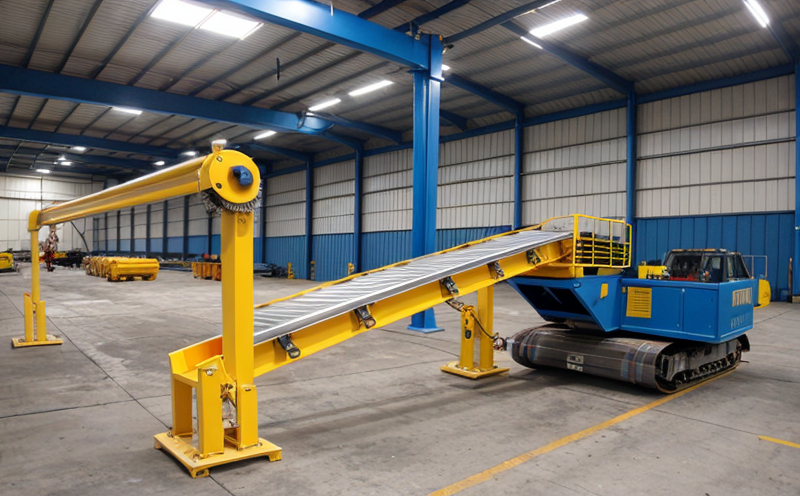EN 14985 Mechanical Strength Testing of Lifting Equipment
The European standard EN 14985 sets out the requirements and testing methods for mechanical strength, including static tests, dynamic tests, and fatigue tests, applicable to lifting equipment used in various sectors like mining. This service ensures that lifting equipment is designed and manufactured to withstand the rigors of industrial environments.
Static tests are conducted to determine the safe working load (SWL) of a piece of lifting equipment under static conditions. Dynamic tests simulate real-world operational scenarios, such as hoisting or lowering loads at varying speeds. Fatigue testing assesses the long-term durability and reliability of lifting equipment by subjecting it to repeated loading cycles.
For mining applications, this standard is crucial for ensuring that conveyor belts, hoists, and lifts can operate safely under extreme conditions. The tests are designed to identify any weaknesses or potential failure points in the equipment before it enters service. This proactive approach helps prevent accidents, extends equipment life, and ensures compliance with regulatory requirements.
The testing process begins with a thorough inspection of the lifting equipment's design and materials. Specimens are then prepared according to the standard’s specifications, which may include cutting samples from the main components or using existing parts for testing. Once prepared, these specimens undergo various mechanical tests to evaluate their strength under different loading conditions.
Instrumentation plays a critical role in this service. High-precision load cells and strain gauges are used to measure forces and stresses during static and dynamic tests. Additionally, displacement sensors help monitor the behavior of lifting equipment as it moves or is subjected to loads. Data from these instruments is collected and analyzed using advanced software tools to ensure accurate results.
The acceptance criteria for EN 14985 are stringent, ensuring that only equipment meeting the highest safety standards can be used in mining operations. Compliance with this standard not only enhances operational safety but also supports a company’s reputation for quality and reliability. By adhering to these testing protocols, we help our clients ensure their lifting equipment is fit for purpose and capable of performing reliably under challenging conditions.
Our team of experienced engineers works closely with clients throughout the testing process, providing expert guidance on specimen preparation, test setup, and data interpretation. We also offer comprehensive reporting services, ensuring that all aspects of the testing are documented accurately and concisely. This detailed documentation is essential for maintaining compliance with regulatory requirements and supporting insurance claims or warranty negotiations.
Real-world applications of EN 14985 include testing various components such as wire rope slings, chain hoists, and lifting platforms used in mining operations. By conducting these tests, we help clients identify potential issues early on, preventing costly downtime and ensuring continuous safe operation. Our commitment to quality is reflected in our adherence to this European standard, which guarantees the mechanical integrity of lifting equipment.
Compliance with EN 14985 is not only a legal requirement but also a best practice for maintaining high standards of safety and reliability. By partnering with us, clients can benefit from our expertise in conducting these tests accurately and efficiently. Our team ensures that every step of the process adheres to the standard's stringent requirements, providing peace of mind regarding equipment performance.
Applied Standards
| Standard Number | Description |
|---|---|
| EN 14985-1 | Part 1: General requirements for mechanical strength testing of lifting equipment |
| EN 14985-2 | Part 2: Static tests and dynamic tests |
| EN 14985-3 | Part 3: Fatigue testing |
Eurolab Advantages
At Eurolab, we pride ourselves on providing top-tier mechanical strength testing services for lifting equipment. Our state-of-the-art facilities and experienced engineers ensure that every test is conducted with precision and accuracy. Here are some of the advantages our clients experience:
- Comprehensive expertise in EN 14985 compliance
- Use of advanced instrumentation and software for data analysis
- Detailed reporting tailored to client needs
- Support throughout all stages of testing, from specimen preparation to final report delivery
- Adherence to strict quality control measures to ensure reliability and accuracy
- Access to industry-leading equipment and facilities
- Commitment to continuous improvement and staying up-to-date with the latest standards and technologies
By choosing Eurolab, clients can trust that their lifting equipment will be thoroughly tested according to the highest industry standards. Our services not only meet regulatory requirements but also enhance operational safety and reliability.
Quality and Reliability Assurance
- Thorough inspection of lifting equipment design and materials before testing
- Preparation of specimens according to standard specifications
- Use of high-precision instruments for accurate data collection during tests
- Data analysis using advanced software tools to ensure precise results
- Detailed documentation of all aspects of the testing process
- Compliance with strict acceptance criteria to guarantee mechanical integrity
- Proactive approach to identifying potential issues early in the testing process
- Continuous improvement and adherence to the latest standards and technologies
The quality and reliability assurance measures we implement during EN 14985 testing are designed to ensure that lifting equipment meets or exceeds all relevant standards. By focusing on these critical aspects, we provide clients with peace of mind regarding their equipment's performance and safety.





